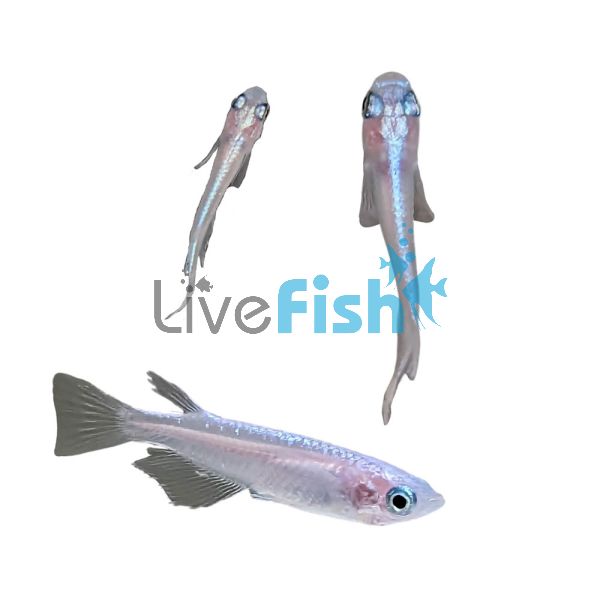Medaka White Super Miyuki 3cm
Medaka also known as rice fish are quickly rising to be a popular aquarium fish. These adorable nano fish are incredibly hardy, cold-water tolerant and come in an assortment of colours through the art of selective breeding. They would be an ideal beginner fish because of these reasons and are even kept in outdoor ponds in the colder regions of Australia, all year round.
Medaka White Super Miyuki
Medaka also known as rice fish are quickly rising to be a popular aquarium fish. These adorable nano fish are incredibly hardy, cold-water tolerant and come in an assortment of colours through the art of selective breeding. They would be an ideal beginner fish because of these reasons and are even kept in outdoor ponds in the colder regions of Australia, all year round.
The White Super Miyuki are one of these amazing strains and are quite easily the most popular. These are a version of the platinum medaka with a lot more refined traits such as their blue sheen and pearl white scales. They have a very close resemble their name ‘rice fish’ since the miyuki medaka look like long grains of rice. They have a wonderful platinum white colour from head to tail with shiny metallic scales across the top of their body. Its body shape is very easily comparable with the tropical guppy however the Medaka is far more underrated and in most cases much more beginner-friendly!
The White Super Miyuki medaka will max out at a size of 4cm. Much like their beautiful colours these fish also have a beautiful, peaceful personality and would be really different addition to any community aquarium. Telling the difference between males and females is difficult in medaka as they do not have any immediate distinguishing factors. When breeding though the female will carry her eggs on the outside of her body for a short time until the male fertilises them, she will then attach them to a soft or leafy surface which is a truly unique behaviour to these fish. Wild medaka can be found in the cold rivers of Japan.
Tank Recommendations for your Medaka White Super Miyuki
The White Super Miyuki medaka is a very active little fish and would be fine in a tank that is 40 litres. A larger aquarium would be ideal as these fish do best when kept in groups and the larger volume will allow for other tank mates
These fish are not fussy at all when it comes to the substrate but will really love a densely planted aquarium. This would also ensure that if the fish end up breeding which is highly likely, the fry have a good chance of surviving.
A really great aquarium setting for these fish would be to have a black tank background, bright green plants and an aquarium light with increased blue spectrum will really showcase the pearl white colour of this medaka strain.
Suitable Tank Buddies
The White Super Miyuki medaka is a very peaceful species which is best suited to be kept with small community fish.
Usually Compatible
Small community fish like neon tetras, ember tetras or rasboras, and even livebearers like guppies.
Sometime Compatible
Anabantoid species such as bettas, gouramis, and species of a similar sort. These species offer a risk of predating on small medaka or outcompeting them.
Rarely Compatible
Aggressive species such as convict cichlids or kribensis which will certainly end up preying on the medaka
Feeding your Medaka White Super Miyuki
The White Super Miyuki medaka much like most small aquarium fish is very easy to feed. They are an opportunistic surface feeder and will take to a wide range of prepared aquarium foods.
Their diet should contain good quality micro floating pellets with frozen food that have a high protein such as bloodworm, brine shrimp, and daphnia. This feeding can simply occur once a day.
| Scientific Name | Oryzias latipes (Japanese Bred) |
|---|---|
| Care Level | Easy |
| Common Names | White Super Miyuki Medaka, Platinum Medaka, Platinum rice fish, Miyuki rice fish, Miyuki Medaka |
| Diet | Omnivore |
| Fish Family | Adrianichthyidae |
| Lifespan (years) | 2 |
| Max. Length (cm) | 4 |
| Min. Tank Volume (l) | 40 |
| Origin | Japan |
| Reef Safe | Yes |
| Sociability | Peaceful |
| Venomous | No |
| Water Conditions | 18-26° C, pH 7.0-8.0 |



